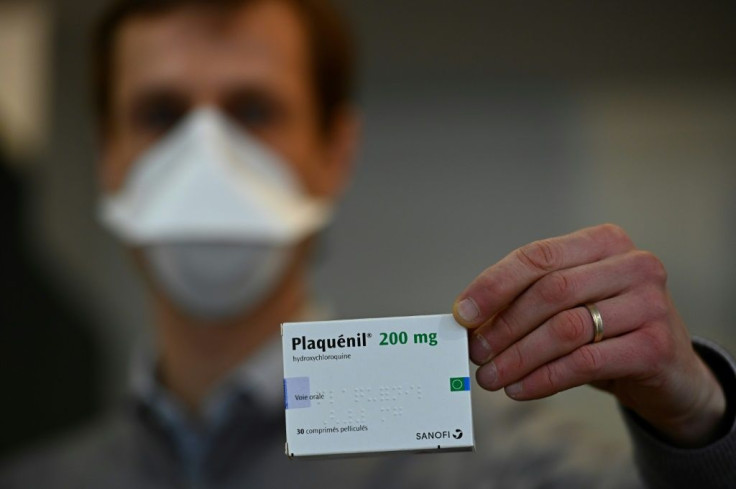Coronavirus Treatement: India Expands Use Of Trump's Hydroxychloroquine As WHO Halts Trials
KEY POINTS
- India has expanded its use of hydroxychloroquine as a preventive for COVID-19
- The WHO temporarily halted its trials of HCQ after a study
- Trump said over the weekend that he had just finished a course of the drug
- So far, India has exported 50 million hydroxychloroquine tablets to the U.S.
India has expanded its use of hydroxychloroquine (HCQ) as a preventive for COVID-19 even as the World Health Organization (WHO) has halted its trials for the drug over safety concerns. The drug is the same one President Donald Trump has touted as a cure for the novel coronavirus and which he has admitted to taking as a preventive measure.
It was just last Friday (May 22) when The Lancet published a study, saying that there are no confirmed benefits to using HCQ on COVID-19 patients. In fact, the study concluded that more people had died from taking HCQ than have recovered, with those who were given HCQ being 34% more likely to die and 137% more likely to develop heart rhythm problems.
Despite this report, authorities in India made the decision to continue recommending the use of HCQ as a prophylactic, or as a means to prevent contracting COVID-19. Specifically, the country's Joint Monitoring Group and National Task Force expanded the recommendation for the use of HCQ to three groups: asymptomatic healthcare workers providing COVID-19 care as well as those in non-COVID hospitals; asymptomatic frontline workers, such as those deployed in containment zones; and asymptomatic household contacts of laboratory-confirmed cases.
An earlier recommendation in March did not include the frontline workers.
"As a prophylactic drug, the medicine has shown results in India which is why it is advised for a larger group now," an Indian Council of Medical Research (ICMR) official who did not wish to be identified said, according to Hindustan Times. "The Lancet paper that has come out will have implications for treatment regimen, not prophylaxis."
According to the ICMR official, what India is doing is testing the drug as a prophylactic, while other countries are testing its use as a medicine to treat those who have tested positive for the novel coronavirus.
"The results look favourable in our population," the official said.
A recent Indian health ministry advisory noted that among healthcare workers involved in COVID-19 care, those who had taken HCQ as a prophylactic were less likely to develop the disease compared to those who had not.

The results from elsewhere in the world, where HCQ is being tested as a treatment for COVID-19, are markedly different. As mentioned earlier, the WHO recently halted its HCQ trials due to concerns that it may do COVID-19 patients more harm than good, a move that came after the study in The Lancet came out.
"The Executive Group has implemented a temporary pause of the hydroxychloroquine arm within the Solidarity Trial, while the safety data is reviewed by the Data Safety Monitoring Board," Director-General Dr. Tedros Adhanom Ghebreyesus said at the May 25 WHO media briefing.
Last weekend, President Trump, said that he had just finished a two-week course of HCQ. In an interview that aired on Sinclair Broadcasting, Trump once again touted the drug, noting the "tremendous" reviews it has got.
"Many people think it saved their lives," Trump said in the interview. "But hydroxy has had tremendous, if you look at it, tremendous, rave reviews."
Trump also claimed, without citing evidence, that thousands of frontline workers, such as doctors and nurses, were taking HCQ to prevent COVID-19.
On May 18, Trump's doctor Sean Conley issued a statement that he had discussions with the President on the advantages and disadvantages of using hydroxychloroquine. "We concluded the potential benefit from treatment outweighed the relevant risks, he said.
The President's revelation that he was taking HCQ came in for widespread criticism, but the Indian health authorities' action seems to validate Trump's premise on the effectiveness of the drug — not as a cure for COVID-19, but as a prophylactic.
In the U.S., HCQ is not approved to treat COVID-19 but the FDA granted the emergency use of the drug for people who have been hospitalized with COVID-19.
According to data firm IQVIA, HCQ sales have soared this year, doubling to 50 million by March. In April, Trump requested India to lift a ban on exporting the drug, even warning of a possible "retaliation" if New Delhi refuses. India is the world's largest producer of the drug used in the treatment of malaria.
India eventually lifted the ban, citing the rapport between Trump and Prime Minister Narendra Modi. By late April, India had exported about 50 million HCQ tablets to the United States.
© Copyright IBTimes 2024. All rights reserved.






















